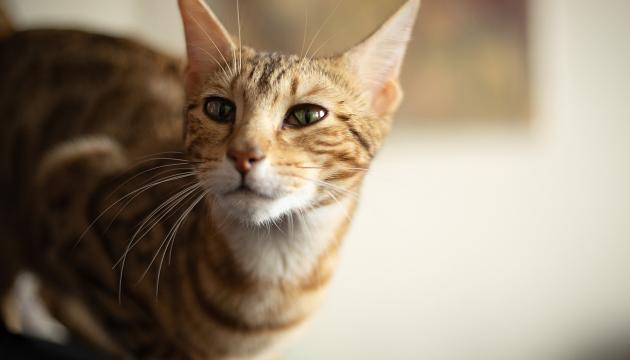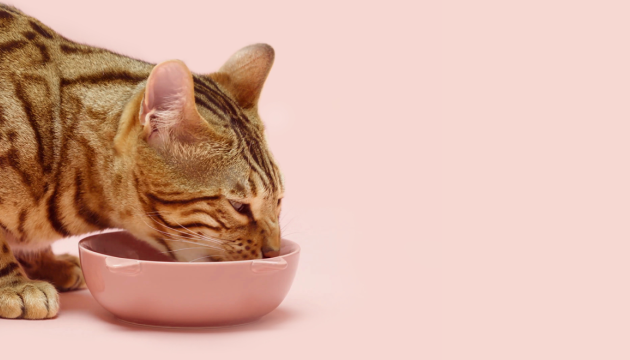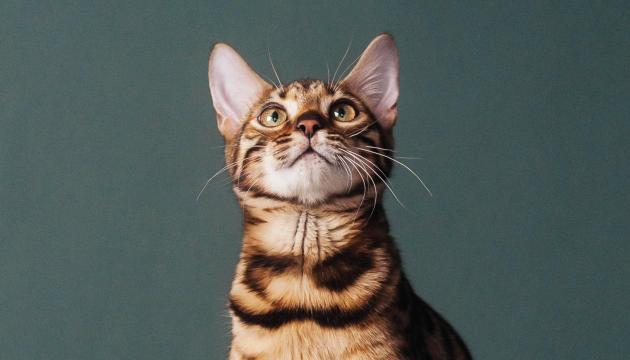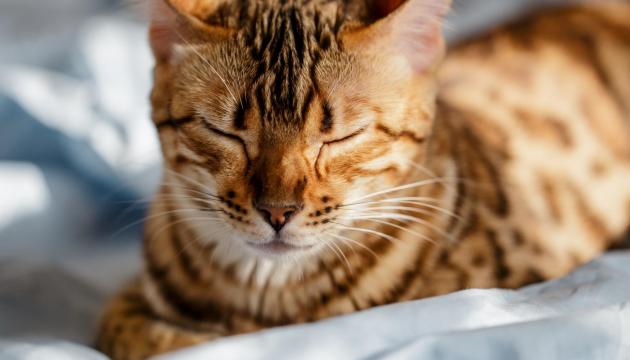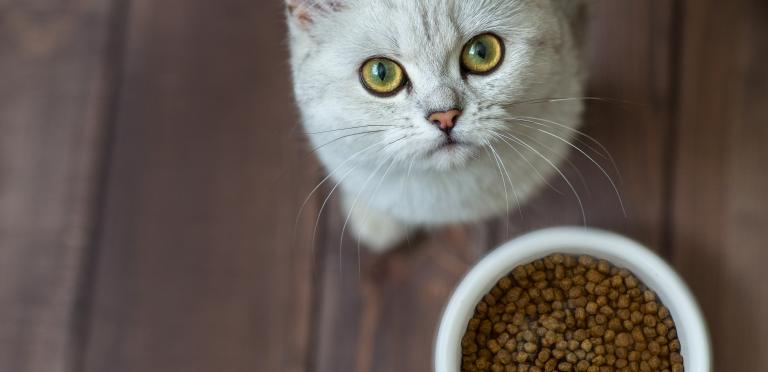

Feeding a cat and cat nutrition
Feeding a cat must be planned to meet the cat's natural nutritional needs. A cat is an obligate carnivore, so its diet must contain enough animal-based protein and fat. However, a cat's well-being is also influenced by how it gets its food.
In this article, we will discuss:
- What is the best food for a cat?
- Nutrients in feeding a cat.
- How much food for a cat?
- How should a cat be fed?
What is the best food for a cat?
Feeding a cat is easiest with high-quality complete food. This ensures that your cat gets enough nutrients. Meaty food rich in animal proteins keeps the cat full, supports the cat's well-being, and helps prevent obesity.
It is best to choose wet food as the main food for a cat, as it also helps keep the cat hydrated. If a cat's diet is mainly dry food, the cat may get too little water, increasing the risk of various urinary tract issues.
Feeding only fish or meat can cause various deficiencies in a cat, as they do not contain all the nutrients a cat needs. You can also prepare cat's food from scratch, but this requires a thorough understanding of cat nutrition. Learn about the natural diet of a cat.
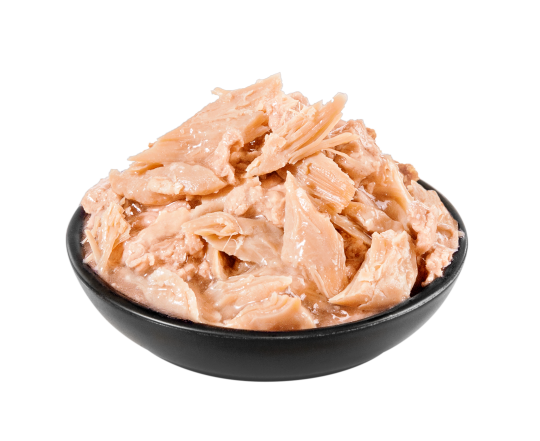
Nutrients in Feeding a Cat
Water
Water is said to be the most important nutrient for a cat, and not without reason. Water
- affects the absorption of other nutrients.
- influences the cat's digestion.
- helps remove toxins and waste products from the cat's body.
- affects the cat's temperature regulation.
However, cats naturally have a weak sense of thirst; their ancestors were desert dwellers who got most of their moisture from their prey. For example, a mouse contains about 75% water. Cats’ drinking technique is also inefficient compared to, for example, a dog's way of lapping water. A cat mainly dips its tongue into the water.
It has even been suggested that the total water intake of cats eating wet food is more than double compared to cats that eat only dry food.
Cats do not respond to slight dehydration by drinking more. When cats start drinking, they may stop before their fluid balance is fully restored. This can lead to chronic dehydration, which increases the risk of various health problems, such as the formation of urinary crystals and stones, which can lead to life-threatening conditions, such as urethral obstruction.
PrimaCat Classic wet food's delicious meat strips are 88% animal-based and contain no added sugar or grains. Discover more!
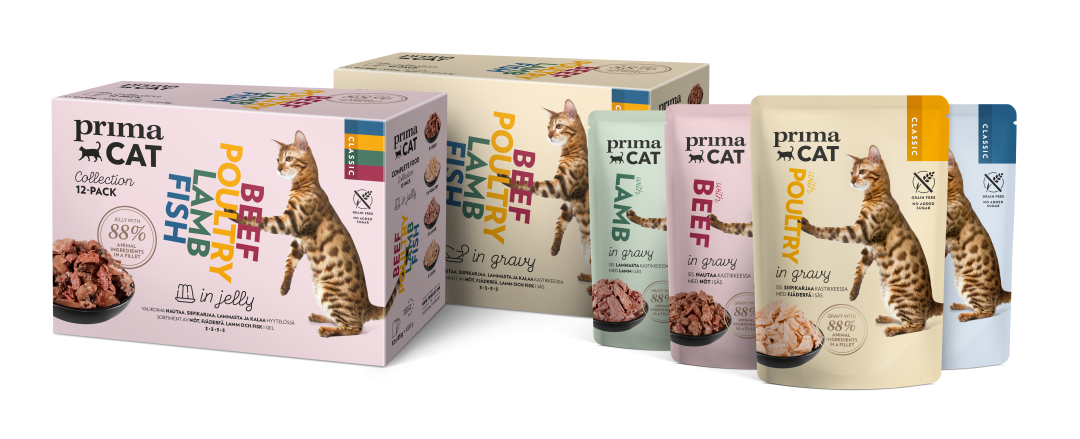
Proteins
A cat needs protein for building fur, skin, nails, hormones, and enzymes. However, a cat does not primarily use proteins as an energy source, but if a cat gets more protein than needed for the body's essential needs, the cat can use protein for energy or eliminate it from the body through urine.
Protein content is often presented in the nutritional information on product packaging as crude protein or the amount of raw protein. It is good to remember that the higher the moisture content of the food, the lower the protein content appears. However, a cat eats significantly more wet food in quantity compared to dry food.
From animal-based protein, such as meat or fish, a cat gets essential amino acids for its vital functions, which its body cannot produce enough of or at all. Examples include arginine and taurine, whose deficiencies can cause blindness, heart disease, and other serious health problems. Protein deficiency can also manifest as muscle loss or, for example, poor-quality fur and skin.
Cats adapt poorly to protein deficiency. If a cat does not get enough protein, it starts breaking down proteins from its muscles to obtain the necessary amino acids. The result is muscle loss.
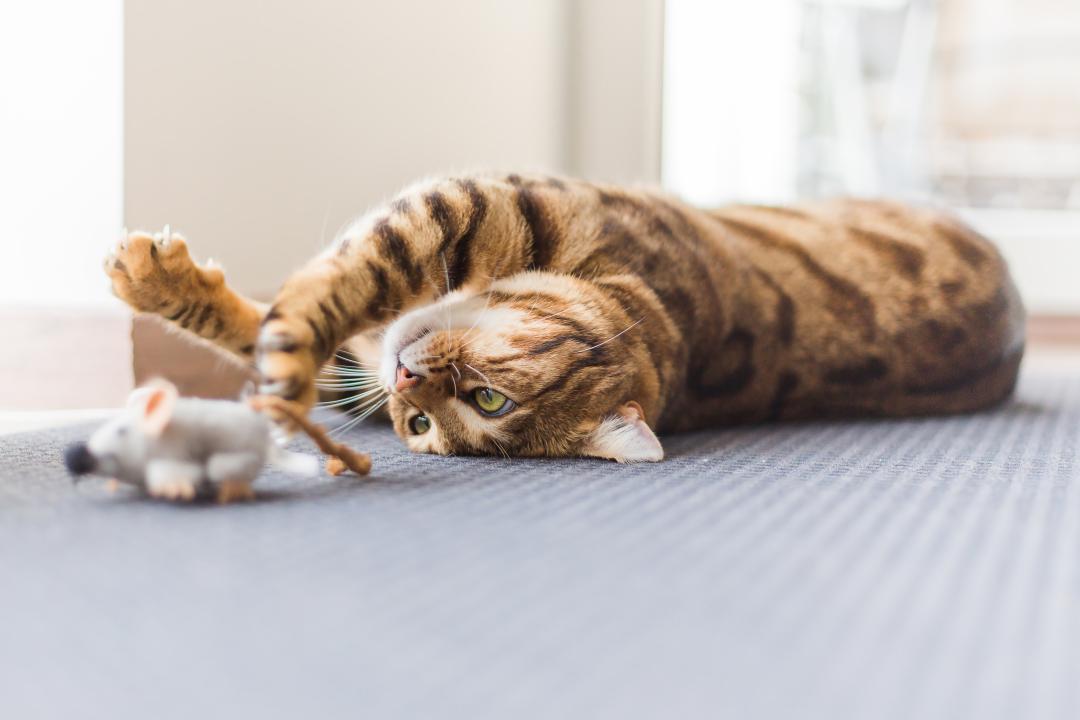
Fats
Fats provide concentrated energy in a cat's diet. A gram of fat contains more than twice as much energy compared to protein or carbohydrate. Fats serve not only as an energy source but also as a factor in hormone function and as the body's energy reserve. Fat deficiency usually manifests as poor-quality skin and fur in a cat.
A cat must get enough omega-3 and omega-6 fatty acids from its diet, as a cat cannot produce them itself. For example, we have added omega-3 and omega-6 fatty acids to our dry foods. Consider also offering a dietary supplement, such as salmon oil, to your cat if the need for essential fatty acids is not met with daily food.
Do not let the fats in cat food become rancid. Especially dry food should be stored protected from light. Also, remember to close the opened bag during storage.
Carbohydrates
Cats can manage entirely without carbohydrates, which can be divided into sugar, starch, and fibre. A cat can use carbohydrates as an energy source, but a high-carbohydrate diet can lead to digestive problems, such as diarrhoea, vomiting, and bloating.
Excessive carbohydrates in a cat’s diet can also contribute to weight gain and obesity in cats. Fat and certain amino acids activate enzymes that participate in regulating eating and increase the feeling of fullness. Therefore, a protein-rich diet with enough fat makes a cat feel fuller compared to consuming a high-carbohydrate diet.
Cats' blood sugar levels also remain lower when their diet consists of high-protein and low-carbohydrate food. This is particularly important in preventing diabetes in cats and in the treatment of cats with diabetes.
However, fibres can be an important part of a cat's diet due to the gut microbiota. For example, fructo-oligosaccharides (FOS) and mannan-oligosaccharides (MOS) are suitable fibres for a cat, acting as natural prebiotics. Prebiotics help promote the balance and health of the cat's gut microbiota, as they are food for good gut bacteria. When added to cat food, FOS and MOS prebiotics support the movement and digestion of food in the gut and strengthen the cat's immunity.
You can find added prebiotics in our dry food products, which include options for both adult cats and kittens. Explore the range and find your silky paw's favourite!
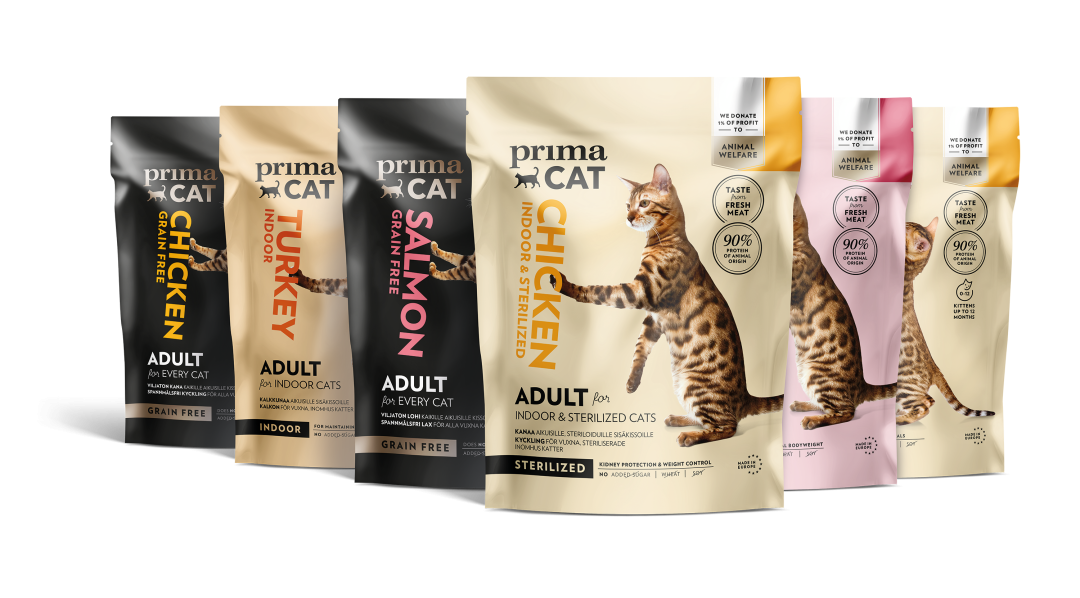
How much food for a cat?
Cat food packages provide a guideline for food portions, which gives a good basis for estimating the cat's daily food amount. However, it is worth remembering that the recommendations do not consider individual variations in cats' energy needs. For example, the energy requirement of a neutered indoor cat is significantly lower than that of an active unneutered cat.
Obesity is the most common feeding error in pet cats. Therefore, it is worth taking a closer look at feeding a cat if the cat starts to gain weight. Read our tips for assessing a cat's body condition and feeding an overweight cat.
Does your cat eat complementary foods, such as PrimaCat Fillets and Soup wet foods? Foods with a high water content and rich in protein are an excellent addition to support the cat's hydration and provide variety to the diet.
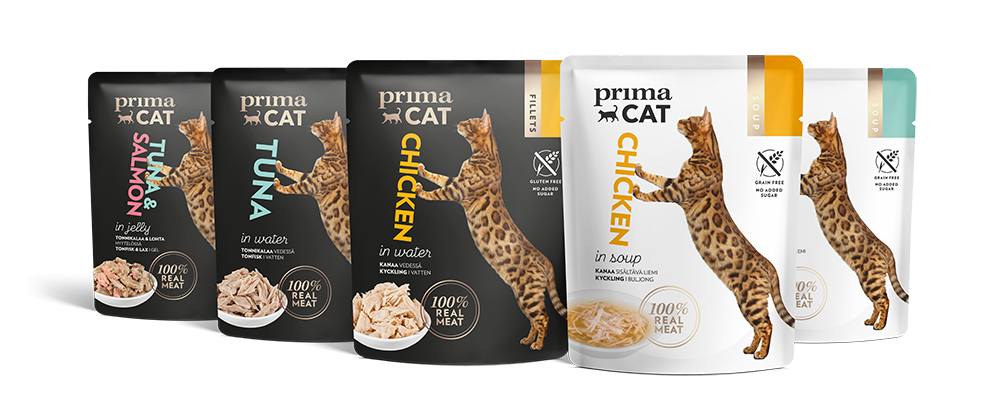
How should a cat be fed?
There are several different ways to feed a cat. One common distinction in feeding methods is between free feeding and meal feeding. Free feeding means that the cat always has food available, for example, a bowl of dry food from which the cat can eat meals independently throughout the day. In meal feeding, the cat receives its food in individual meals, and food is not available continuously.
Free feeding can pose challenges in situations where the cat is overweight or has been sterilised or neutered, as the energy requirement is up to 25-50% lower compared to an unneutered cat. Tasty food tempts the cat to eat out of boredom or simply because the cat gets pleasure from eating.
Furthermore, if there are multiple cats in the household, it can be difficult to know the individual food intake of each cat if free feeding is the method used.
Disadvantages of free feeding:
- The cat has an increased risk of obesity.
- Changes in feeding can be more difficult.
- It is challenging for an owner of multiple cats to know the amount of food eaten by each individual cat.
- Food cannot be used to create or strengthen the relationship between the human and the cat, nor to regulate the cat's activity rhythm.
On the other hand, free feeding also has benefits.
Benefits of free feeding:
- The cat regulates its own eating rhythm.
- The cat may drink more.
- The cat can eat several small meals a day if desired.
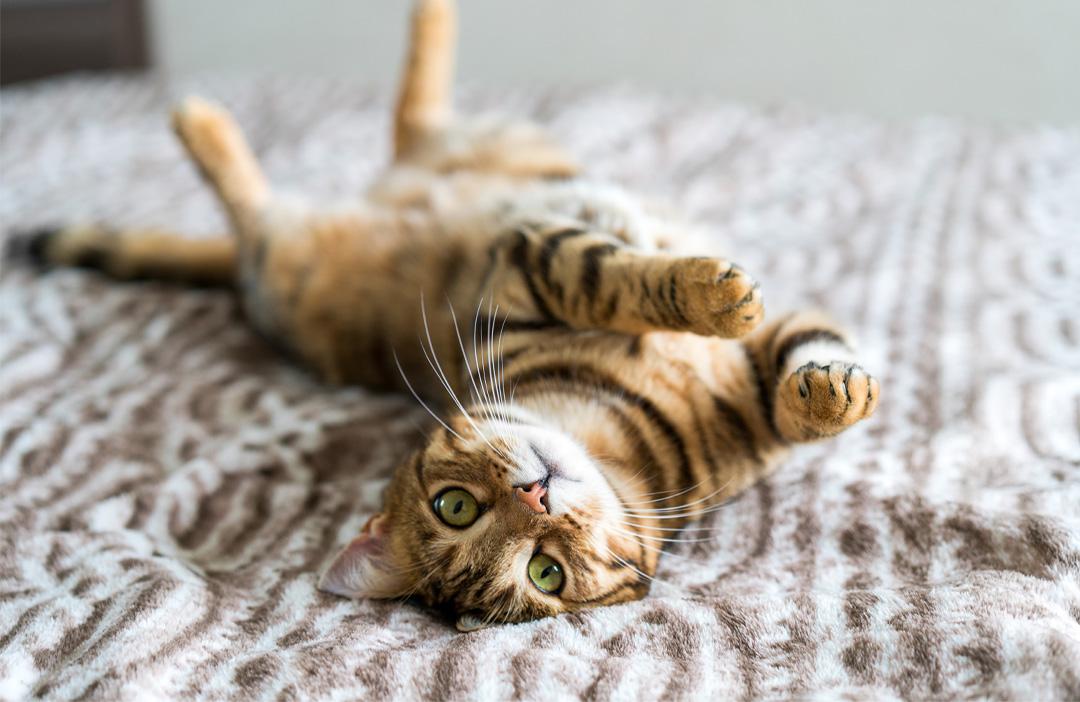
Meal feeding requires more scheduling from the cat owner but brings many benefits.
Benefits of meal feeding:
- Changes in the cat's eating habits are easier to notice.
- In a multi-cat household, it is easier to manage the individual food intake of each cat.
- Food can be used to create or strengthen the relationship between the human and the cat.
- The cat has a lower risk of obesity.
Disadvantages of meal feeding:
- Compared to the eating rhythm of a hunting cat, the cat receives only a few meals.
- The owner may have to plan their own schedule according to the cat's meal rhythm.
- Restricting food intake can stress a cat that is not used to it.
If a cat owner decides to change the feeding method, it is advisable to make the changes gradually. When transitioning from free feeding to meal feeding, the cat's food bowl can initially be removed from the cat's reach for a couple of hours and gradually increase the time.
Are you changing your cat's food? Check out our practical tips for changing a cat's food.
Observe your own cat's eating rhythm and habits. This way, you will find out what kind of food your cat prefers, making feeding a cat easier. At the same time, you will more easily notice any changes in the cat's behaviour, which can help in detecting health problems.
